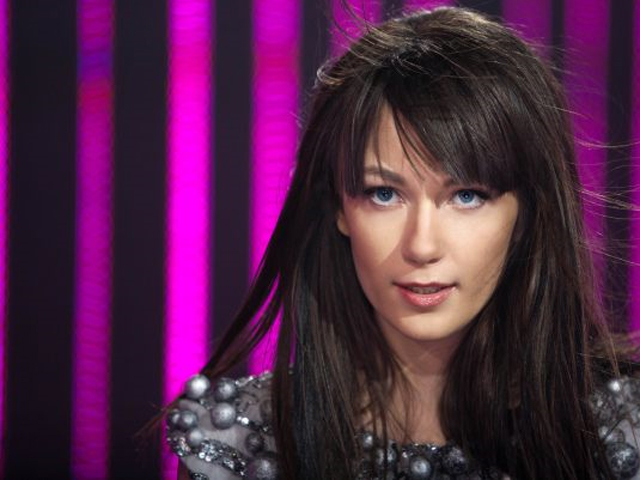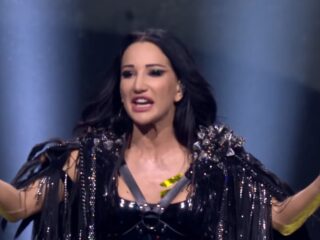If members of the Soviet Politburo ever produced an adult video, it might have looked something like this. In “I Love Belarus,” Anastasiya Vinnikova suggests that nationalism is sexy, and that loving your motherland will get you some love from its daughters. In the opening bars, the 20-year-old singer–prone to posing provocatively in silhouette–describes herself as “free, friendly and young.” She then invites us on a three-minute journey of double-meaning and Belarusian flag-waving: “I have so much and I’m ready to show you/Let’s come together so here is my hand/ We’re gonna fly watching lakes in their full view/ Fields are full of gold, and it’s all my land.”
WATCH:
The land she presents is a mix of tradition and modernity. The video showcases three karaoke-quality back-up singers, who occasionally step aside so that a troupe of folk dancers can perform Belarusian aerobics. Anastasiya gyrates among all of them, as comfortable with the electro-beat as she is with the dulcimer. Amid the pouting and hair-tossing and tugging of her silk dress, she works her way to the chorus and finally consummates her relationship with the nation.
I love Belarus/ Got it deep inside/ I love Belarus/ Feel it in my mind/ And I wanna see the sun/ Shining from above/ You will always be the one/ I can’t get enough
But in “I Love Belarus,” Anastasiya tones down what she really feels. A professional jury of music producers actually selected her to represent the country based on a previous version of the song entitled “Born in Belorussia,” which was even more provocative. Here’s a taste:
When I was wearing a star/ Back in the USSR/ I was as good as mama/
Feel my passion/ … Born in Belorussia/ USSR time/ Belorussia, got you on my mind/ You’re my passion, do it old-fashioned/ You and I
After much handwringing, and perhaps a nudge from state broadcaster and Eurovision sponsor BTRC, songwriter Evgeny Oleyik decided to recast the lyrics. “The song was not originally written for Eurovision,” he said at the time. “It was dedicated to the era of the Soviet Union and has nuances that are incomprehensible to the European public. The new lyrics will describe the life of today’s Belarus.”
And that brings us back to Anastasiya, whose transformation from mere singer to patriotic fantasy isn’t as trivial as you might think. In recent months Belarusians have watched violence and protest engulf the nation. First President Alexander Lukashenko won a fourth term in office amid accusations of vote rigging and intimidation in December 2010. Then police arrested up to 600 protesters–including seven opposition candidates–as part of a crack down on mass demonstrations. In February, when Anastasiya presented her ode to Belarus, she reminded folks of the good times and, for a moment, eased the anxiety of her countrymen. Given that background, you can forgive the Eurovision jury for indulging the nationalistic wet dream.
Prediction:
In its seven previous appearances at Eurovision, Belarus has only advanced past the semi-finals twice. Clearly love from its former Soviet neighbors isn’t enough to pull Belarus through to the final automatically. History isn’t the only thing working against them. The message of the song–that Belarus is amazing–will likely tick off the European electorate who may interpret that as a slight against their own country, regardless of Anastasiya’s intentions. It’s no wonder that bookies have her down as a 50:1 outsider to win the second semi-final. That puts her 15th on the list of 19 countries in that heat, suggesting she won’t advance to the final–and will finish somewhere near the bottom.
Read more of Wiwi’s Eurovision 2011 profiles:









